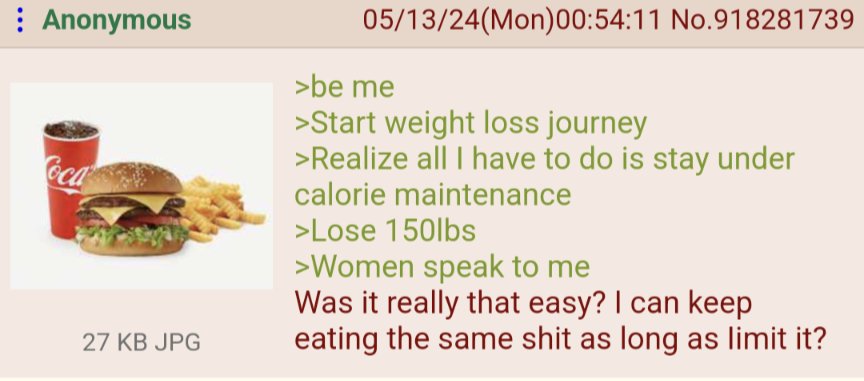this post was submitted on 27 May 2024
771 points (97.2% liked)
Greentext
6584 readers
1492 users here now
This is a place to share greentexts and witness the confounding life of Anon. If you're new to the Greentext community, think of it as a sort of zoo with Anon as the main attraction.
Be warned:
- Anon is often crazy.
- Anon is often depressed.
- Anon frequently shares thoughts that are immature, offensive, or incomprehensible.
If you find yourself getting angry (or god forbid, agreeing) with something Anon has said, you might be doing it wrong.
founded 2 years ago
MODERATORS
you are viewing a single comment's thread
view the rest of the comments
view the rest of the comments

Someone I look up to more convincingly said the same thing. I scoffed but he knows what he’s talking about.
I lost so much weight so fast—during the beginning of the pandemic no less—by only staying beneath the magical number everyday.
How do you calculate the calorie maintenance number¿?
2200 is about expected maintenance level for a man that does normal daily activities (going on walks, cleaning around the house and so on).
If you currently maintain your weight with whatever you're eating and drinking then calculate how much calories there is in what you're currently eating and drinking (average for the week) and cut that by 500 a day to lose 1 pound a week.
If you're increasing your physical activity as well then take that into consideration, it's much more healthy and effective in the long run (in most situations) to just continue eating the same but to start being active, this way you're not taking anything away, you're adding something to your life.
It doesn't much matter how accurate your calorie estimates are. If you estimate that your daily caloric requirement is 2500 and you're eating 2000 calories a day, then you should be losing about one pound a week (1 pound of fat = 3500 calories). If you find instead that your weight is remaining constant, then either your caloric requirement estimate or your caloric intake estimate is wrong (or both are). In either case, your only option is to eat even less, per your measurements.
I used the same awful but free (with option to upgrade but no need) app the guy I look up to used (and it also knows how many calories I burn in activity during a day). It even has an awful name, but the results are amazing and it already has a ton of the foods I eat in it and it gets easier to use with time.
MyFitnessPal: https://myfitnesspal.com
I used to use that as well until I got good enough at tracking to just do it in my head. It was a decent app just annoying that it didn't really seem to have any moderation on people submitting foods and a lot were way off and sometimes 6 or 7 of the exact same thing. Still the best app for it I found.
Exactly the same with me and exactly my opinion. But congrats to us both!
Don't bother with apps, many website even certain official healthcare sites will have info about food calories, even some calculators and the intake for your age/weight/gender/etc. It seems that if you're biologically female you're kinda screwed though, my partner had much harder time getting 1/10th of result I was getting.
When it comes to counting food calories, you don't necessarily need exact numbers for raw ingredients and that info is out there, for anything else check out packaging and add it all up per day.
You kind of can't. Caloric intake from food varies by person, as does energy use. You can use a calculator for a ballpark measure and then see how it works out for your weight.
Type of food can also matter, because depending on your stomach bacteria, you will also get different energy value from different foods. I thought an easy way for me to lose weight would be to stop eating sweets (since i prob averaged around 500kcal nominal value per day), but nope I ended up gaining weight, probably from eating slightly more normal food. What I found works for me was delaying each meal for longer so I end up eating one large and one smaller meal per day. Going to bed slightly hungry then I usually wake up not hungry and it takes a few hours before I feel the need to eat something, etc.
I even once lost weight drinking about 2 liters of choccy milk per day but eating a lot less regular food, though I wouldn't recommend that because that much sugar is terrible for you anyway. Far worse than being a bit overweight, probably.
The answer to your question is to calculate your BMR, or basal metabolic rate. It's an approximate calculation based on your sex, age, height, and weight. Your BMR is the amount of calories you need to maintain life when completely sedentary. If you only eat that number of calories, and do ANY physical activity, you will begin to lose weight as your body taps into your reserves for energy.
There is more nuance, but the simple math is calories in vs calories out. If you have a deficit, your weight will decrease. People counting calories to lose weight generally target their BMR minus 200 to 500 calories daily, though 500 is a bit much in my experience.